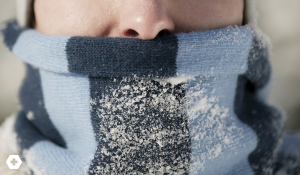
Winter Skin Care for Patients with Atopic Dermatitis: Key Tips for Clinicians

While winter brings snow, festive holidays, and cozy sweaters, it can also bring dry skin. For patients with atopic dermatitis, or eczema, winter often worsens eczema symptoms due to cold air, indoor heating, and increased exposure to triggers such as stress. To help your patients manage their atopic dermatitis, focus on these three key strategies:
1. Hydrate, hydrate, hydrate!
Encourage patients to use thick emollient creams or ointments, applying them immediately after bathing and throughout the day to lock in moisture. Moisturizers should be cream or ointment-based. Patients with dry skin should avoid lotions that often contain alcohol, which can contribute to a stinging sensation and further drying effect on the skin. A tip you can share with your patients from a board-certified allergist is to avoid moisturizers with a pump, as they are often too thin and contain alcohol. Typically, moisturizers in tubes and jars are thicker cream or petroleum-based. Recommend lukewarm baths with fragrance-free cleansers to protect the skin barrier.
2. Address Environmental Factors
Indoor heating is a necessity on a chilly winter day, but the dry air can trigger worsening atopic dermatitis. Suggest using humidifiers at home to combat dryness caused by indoor heating and advise patients to wear soft, breathable fabrics to minimize irritation. Layer clothing to prevent overheating and avoid rough materials like wool against the skin. Atopic dermatitis triggered by allergens like household dust mites may be worse in the winter when patients are inside more often. Hypoallergenic pillowcases, air filters, and frequent vacuuming of carpets and curtains can help reduce household dust mite exposure.
3. Support Treatment Adherence
Patients with atopic dermatitis commonly have a skin care regimen prescribed by their clinician that includes steroids and other topical creams like calcineurin inhibitors. Reinforce the importance of consistent use of prescribed treatments during flares. Patients with persistent symptoms should be seen. A referral to a dermatologist or allergist may be warranted for symptoms that are refractory to topical therapies.
By emphasizing these strategies, we can help patients reduce winter eczema flares and maintain healthier skin.
Practice-Changing Education
Experience education that goes beyond theory. Explore Hippo Education’s offerings below.





